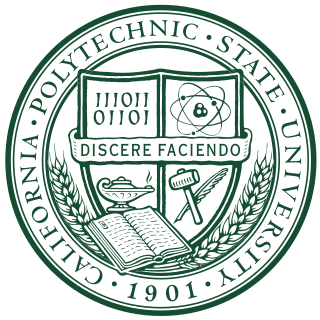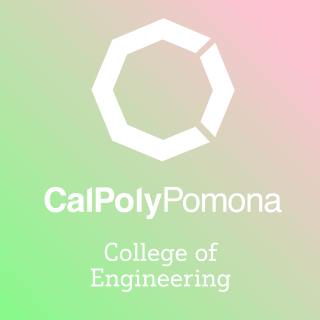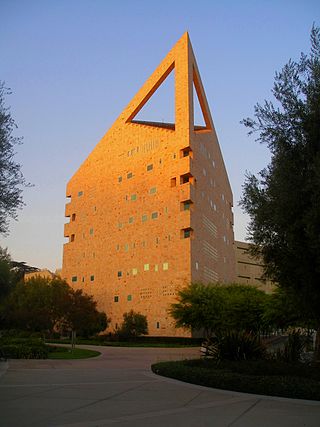
Pomona is a city in eastern Los Angeles County, California, United States. Pomona is located in the Pomona Valley, between the Inland Empire and the San Gabriel Valley. At the 2020 census, the city's population was 151,713. The main campus of California State Polytechnic University, Pomona, also known as Cal Poly Pomona, lies partially within Pomona's city limits, with the rest being located in the neighboring unincorporated community of Ramona.

The Arabian or Arab horse is a breed of horse with historic roots on the Arabian Peninsula. With a distinctive head shape and high tail carriage, the Arabian is one of the most easily recognizable horse breeds in the world. It is also one of the oldest modern breeds. Although modern DNA cannot trace breed purity in the modern population beyond 200 years, there is archaeological evidence of horses in the Middle East with landrace characteristics that resemble modern Arabians dating back 3,500 years. Throughout history, Arabian horses have spread around the world by both war and trade, used to improve other breeds by adding speed, refinement, endurance, and strong bone. Today, Arabian bloodlines are found in almost every modern breed of riding horse.

California Polytechnic State University, San Luis Obispo is a public university in San Luis Obispo County, adjacent to the city of San Luis Obispo. It is the oldest of three polytechnics in the California State University system.

California State Polytechnic University Pomona, is a public polytechnic university in Pomona, California. It is the largest of the three polytechnic universities in the California State University system.

Will Keith Kellogg was an American industrialist in food manufacturing, who founded the Kellogg Company, which produces a wide variety of popular breakfast cereals. He was a member of the Seventh-day Adventist Church and practiced vegetarianism as a dietary principle taught by his church. He also founded the Kellogg Arabian Ranch, which breeds Arabian horses. Kellogg was a philanthropist and started the Kellogg Foundation in 1934 with a $66-million donation.

The W. K. Kellogg Foundation was founded in June 1930 as the W. K. Kellogg Child Welfare Foundation by breakfast cereal pioneer Will Keith Kellogg. In 1934, Kellogg donated more than $66 million in Kellogg Company stock and other investments to the W. K. Kellogg Trust. Ninety years later, the W.K. Kellogg Foundation manages more than eight billion dollars in assets and is one of the largest philanthropic foundations in the world.
Phillips Ranch is a master-planned community, first developed by Louis Lesserin 1965. It is located in the southwestern portion of the city limits of Pomona, in Los Angeles County, California. It is located near the Pomona Freeway, the Orange Freeway, and the Chino Valley Freeway. The zip code serving the neighborhood is 91766. Phillips Ranch is 4 miles southwest of downtown Pomona, and is mostly working to upper-middle class in a generally diverse community. Many residents use "Phillips Ranch, CA" as a return address, which is an acceptable alternative to Pomona, CA, according to the United States Postal Service. Phillips Ranch is often referred to by its neighborhood name instead of by the city name.

The Cal Poly Pomona College of Engineering is the engineering college at California State Polytechnic University, Pomona located in Pomona, California, United States. Known for its "learn by doing" philosophy, the college's motto, coined by Dean Mahyar A. Amouzegar in 2012, is: "Learn by Doing: Making Imagination Real". Cal Poly has one of the "most recognized engineering programs in the country" and, with nearly 6,000 students, it is also the largest engineering college in Southern California, the second largest college of engineering in the California State University system, and the seventeenth largest engineering college in the United States. In the 2024 U.S. News & World Report's "America's Best Colleges" edition, the College of Engineering is ranked 9th overall out of 210 public and private undergraduate engineering schools in the U.S. where doctorates are not offered.
W. K. Kellogg Airport is a city-owned, public-use, joint civil-military airport located three nautical miles (6 km) west of the central business district of Battle Creek, a city in Calhoun County, Michigan, United States. The airport is accessible by road from Helmer Road, and is located near I-94. It is included in the Federal Aviation Administration (FAA) National Plan of Integrated Airport Systems for 2017–2021, in which it is categorized as a regional general aviation facility. It is also known as W. K. Kellogg Regional Airport.

International Polytechnic High School, commonly referred to as iPoly, is a public college-preparatory demonstration high school (9-12) found in the California State Polytechnic University, Pomona campus and operated by the Los Angeles County Office of Education (LACOE) in collaboration with the College of Education and Integrative Studies at the university. iPoly's curriculum is fully accredited by the Western Association of Schools and Colleges and is approved by the University of California and California State University. It runs hand-in-hand with the Los Angeles County High School for the Arts (LACHSA), which is also run by LACOE. Since iPoly does not lie in a fixed school district, it draws students from all over Los Angeles, San Bernardino, Orange and Riverside counties. Most of the students come from the Pomona and San Gabriel valleys. In 2009, 2013, and 2019, iPoly was honored as a California Distinguished School by the California Department of Education.
The Don B. Huntley College of Agriculture is the college of agriculture at California State Polytechnic University, Pomona located in Pomona, California, United States. Founded in 1938, the college offers instruction in eight majors leading to the bachelor of science degree. Over 700 acres (2.8 km2) of university-owned land are available for pastures, crops, groves and ornamental plantings.
The Collins College of Hospitality Management is a college part of the California State Polytechnic University, Pomona. Founded in 1973, it was the first hospitality management studies program in California and its thousand students make it the largest such school in the state. As of 2010, The Collins College of Hospitality Management is ranked third in the nation by restaurant executives. Andrew Hale Feinstein is Dean and James A. Collins Distinguished Chair. With approximately 1,400 undergraduate students, the college is the largest of its kind in the country.

The Classroom, Laboratory & Administration Building, commonly known simply as the CLA Building, was an administrative building on the campus of California State Polytechnic University, Pomona. Designed by Albuquerque, New Mexico–based architect Antoine Predock in the Futurist style and completed in 1993, it has come to be the defining image of the university. The Administration portion of the building was demolished in August 2022 after a discovery of a fault line under the building.

The Cal Poly Pomona University Library is an on-campus University Library serving students at Cal Poly Pomona. The University Library combines digital resources and state-of-the-art technology with traditional holdings. The library offers shared and private spaces for more than 10,000 students.
Abu Farwa was an Arabian stallion used in the W.K. Kellogg Institute horse breeding program at Cal Poly, Pomona.
The 1969 Cal Poly Pomona Broncos football team represented California State Polytechnic College, Kellogg-Voorhis—now known as California State Polytechnic University, Pomona—as a member of the California Collegiate Athletic Association (CCAA) during the 1969 NCAA College Division football season. Led by first-year head coach Roy Anderson, Cal Poly Pomona compiled an overall record of 2–8 with a mark of 1–2 in conference play, placing third in the CCAA. The team was outscored by its opponents 287 to 110 for the season. The Broncos played home games at Kellogg Field in Pomona, California.
The Cal Poly Pomona College of Letters, Arts, and Social Sciences is the humanities, social sciences, and performing arts college at California State Polytechnic University, Pomona located in Pomona, California, United States. The College of Letters, Arts & Social Sciences (C.L.A.S.S.) educates students in eleven disciplines of study: Communication, Economics, English and Modern Languages, Geography and Anthropology, History, Music, Philosophy, Political Science, Psychology and Sociology, Ethnic and Women's Studies, and Theater and New Dance.
The 1967 Cal Poly Pomona Broncos football team represented California State Polytechnic College, Kellogg-Voorhis—now known as California State Polytechnic University, Pomona—as an independent during the 1967 NCAA College Division football season. Led by first-year head coach Ray Daugherty, Cal Poly Pomona compiled a record of 2–8. The team was outscored by its opponents 317 to 192 for the season. The Broncos played home games at Kellogg Field in Pomona, California.
The 1966 Cal Poly Pomona Broncos football team represented California State Polytechnic College, Kellogg-Voorhis—now known as California State Polytechnic University, Pomona—as an independent during the 1966 NCAA College Division football season. Led by Don Warhurst in his tenth and final season as head coach, Cal Poly Pomona compiled a record of 5–5. The team outscored its opponents 264 to 263 for the season. The Broncos played home games at Kellogg Field in Pomona, California.

Manor House is the official residence of the President of California State Polytechnic University, Pomona, located in Pomona, California.













